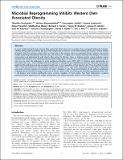Microbial Reprogramming Inhibits Western Diet-Associated Obesity
Author(s)
Poutahidis, Theofilos; Kleinewietfeld, Markus; Levkovich, Tatiana; Bhela, Siddheshvar; Chatzigiagkos, Antonis; Hafler, David A.; Alm, Eric J.; Erdman, Susan E.; Varian, Bernard; Ibrahim, Yassin; Lakritz, Jessica; Kearney, Sean Michael; Smillie, Chris Scott; Perrotta, Allison Rose; ... Show more Show less
DownloadPoutahidis-2013-Microbial reprogramm.pdf (1.551Mb)
PUBLISHER_CC
Publisher with Creative Commons License
Creative Commons Attribution
Terms of use
Metadata
Show full item recordAbstract
A recent epidemiological study showed that eating ‘fast food’ items such as potato chips increased likelihood of obesity, whereas eating yogurt prevented age-associated weight gain in humans. It was demonstrated previously in animal models of obesity that the immune system plays a critical role in this process. Here we examined human subjects and mouse models consuming Westernized ‘fast food’ diet, and found CD4[superscript +] T helper (Th)17-biased immunity and changes in microbial communities and abdominal fat with obesity after eating the Western chow. In striking contrast, eating probiotic yogurt together with Western chow inhibited age-associated weight gain. We went on to test whether a bacteria found in yogurt may serve to lessen fat pathology by using purified Lactobacillus reuteri ATCC 6475 in drinking water. Surprisingly, we discovered that oral L. reuteri therapy alone was sufficient to change the pro-inflammatory immune cell profile and prevent abdominal fat pathology and age-associated weight gain in mice regardless of their baseline diet. These beneficial microbe effects were transferable into naïve recipient animals by purified CD4[superscript +] T cells alone. Specifically, bacterial effects depended upon active immune tolerance by induction of Foxp3[superscript +] regulatory T cells (Treg) and interleukin (Il)-10, without significantly changing the gut microbial ecology or reducing ad libitum caloric intake. Our finding that microbial targeting restored CD4[superscript +] T cell balance and yielded significantly leaner animals regardless of their dietary ‘fast food’ indiscretions suggests population-based approaches for weight management and enhancing public health in industrialized societies.
Date issued
2013-07Department
Massachusetts Institute of Technology. Computational and Systems Biology Program; Massachusetts Institute of Technology. Department of Biological Engineering; Massachusetts Institute of Technology. Department of Civil and Environmental Engineering; Massachusetts Institute of Technology. Division of Comparative MedicineJournal
PLoS ONE
Publisher
Public Library of Science
Citation
Poutahidis, Theofilos, Markus Kleinewietfeld, Christopher Smillie, Tatiana Levkovich, Alison Perrotta, Siddheshvar Bhela, Bernard J. Varian, et al. “Microbial Reprogramming Inhibits Western Diet-Associated Obesity.” Edited by Laurel L. Lenz. PLoS ONE 8, no. 7 (July 10, 2013): e68596.
Version: Final published version
ISSN
1932-6203